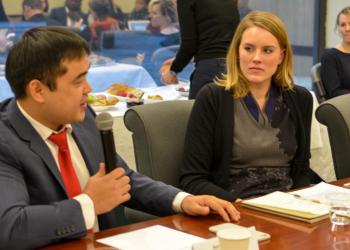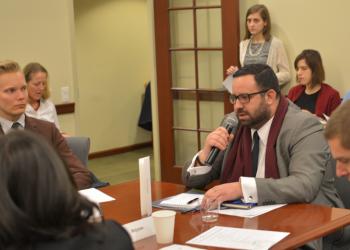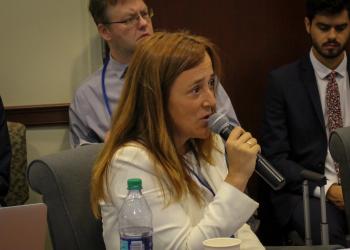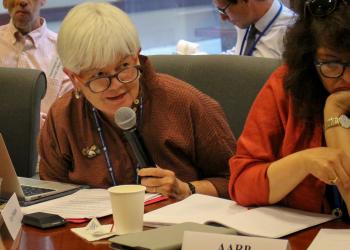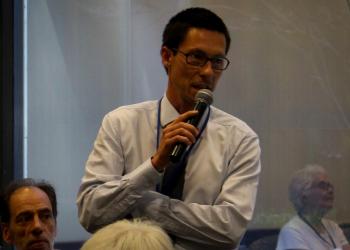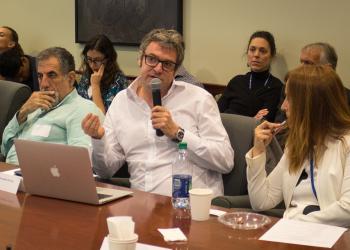"Leave no one behind" lunch meetings bring together UN diplomats and those most often forgotten
Situated in one of the world’s wealthiest neighborhoods, the United Nations can be something of an economic and social bubble for the diplomats and officials who work there, isolating them from the cares and concerns of ordinary people – and especially those on the margins of society.
Yet few doubt that the women and men who work in and around the UN see it as part of their mission to help those who are less materially fortunate.
Most critically, Agenda 2030, the UN’s ambitious plan for international development, pledges that “no one will be left behind,” promising to focus “in particular on the needs of the poorest and most vulnerable.”
With that in mind, the Baha'i International Community, in co-sponsorship with several other civil society organizations and a number of UN diplomatic missions, have launched a new dialogue series aimed at bringing UN policy makers involved in the creation and implementation of Agenda 2030 together with some of the people who have been “left behind” or otherwise marginalized by society at large.
So far, there have been four such dialogues, all held at the offices of the BIC over lunch. All have been co-sponsored by SOS Children’s Villages International and the International Movement ATD Fourth World, along with a government mission to the UN.
Lack of parental care
The most recent one, held 14 February 2017, focused on children who have lost or who face losing parental care.
Co-sponsored by the Permanent Mission of Austria to the United Nations, the lunch event featured a moving talk by Mianna, a 17-year-old girl from Chicago who grew up in foster care.
Mianna told assembled diplomats, UN officials, and civil society representatives that she and her 13 siblings have faced numerous hardships because of the absence of parental support – but that she now forgives and, even, understands the reasons her birth parents could not raise her.
She now wants to become a lawyer, so she can help her siblings and others, but she said she wished society could have done more to end the conditions that gave rise to her situation.
“If action would have been taken 50 years ago to help my grandmother escape the cycle of violence and poverty she was trapped in, all the suffering that my mother, and now my siblings and I are going through, would have been prevented,” she said.
“Supporting one single person emotionally so that she can get out of poverty, benefits not only her, but everybody around her and generations to come.”
Ambassador Jan Kickert of the Permanent Mission of Austria also spoke, outlining policy efforts and good practices that can be taken to help children without parental care.
A child that loses his or her parents also loses his or her “first line of protection,” he said. “But a world that invests in its children, and enables a child to grow up in an environment free of violence” must be our goal.
“Each child and youth without parental care should be given the chance to shape their future and to become a self-reliant participant in society,” said Ambassador Kickert.
Earlier meetings likewise featured testimony or talks by individuals experiencing different kinds of marginalization from around the world – and accompanying introductions by diplomats.
Addressing the “core principle”
The first meeting, held 29 June 2016, set the tone for the style and approach of the conversations to come. It highlighted some of the key practices crucial to ensuring that no one is left behind and policy initiatives reach those farthest behind first.
“As a core principle of the 2030 Agenda, leaving no one behind requires a fundamental shift in not only the implementation of the Agenda, as well as in our approach to the SDGs,” said Oh Youngju, Ambassador and Deputy Permanent Representative of the Permanent Mission of the Republic of Korea to the UN, which co-sponsored the meeting.
“In this regard, understanding who is left behind and how far behind they are will be critical.”
Ambassador Oh then offered her country as a case study in term of gender equality, noting that while South Korea has made great strides economically, there remains a persistent gender gap in the labor force, which is partly due to the traditional perception that family and childrearing are female responsibilities.
“Gender equality is critical for growth in the SDG-context,” said Ambassador Oh. “We will need to move away from perceiving the gender issue as a zero-sum game, and instead foster a holistic social mindset and integrated policy approach to enhance equality between men and women.”
Ambassador Oh was joined by Maryann Broxton, an activist with International Movement ATD Fourth World, who talked about the importance of zeroing in on poverty in any consideration of who is “left behind.”
“Poverty in its nature is all-consuming,” said Ms. Broxton. “It not only affects a person physically, but also their emotional well-being and mental capacity.”
Second and third meetings
The second meeting in the series, held 14 September 2016, considered issues of migrants and refugees in relation to Agenda 2030. Mateo Estrémé, the Deputy Permanent Representative of Argentina to the United Nations, and Marlon Wallen, an activist with International Movement ATD Fourth World, spoke at that meeting.
The third meeting, held 20 October 2016, examined the situation of people with disabilities. It featured remarks by H.E. Mr. Walton Alfonso Webson, Permanent Representative of Antigua and Barbuda to the United Nations, and Sparsh Shah, Youth Ambassador for St. Jude’s Children Research Hospital, a singer and songwriter with multiple sclerosis.
Among other things, participants in October concluded that “inclusion is more than a project -- it is a philosophy, one that is embedded in the context of human rights” and that “We need to give the people who face these barriers (and their families) a voice, because they have an inherent capacity, and because they often are the ones left furthest behind.”
Daniel Perell, a representative of the Baha'i International Community to the UN, said more such lunch meetings are in the works.
“What we are trying to do is to create a space where those who are on the margins of society, who have been ‘left behind,’ can actually have their voices heard by decision-makers,” said Mr. Perell.
“And so far, we feel this has been achieved. We have heard some extremely heart-felt and moving stories which have helped bring to reality the kinds of discussions that are otherwise merely in the realm of policy,” he said.
